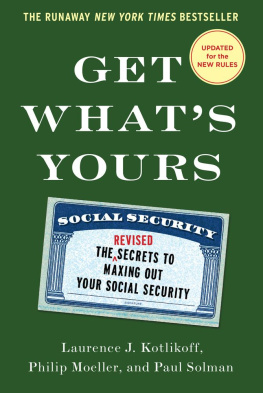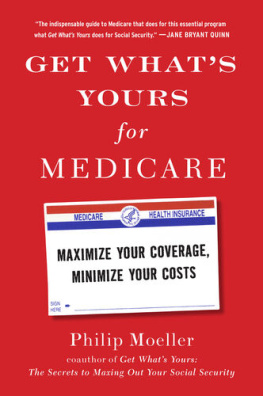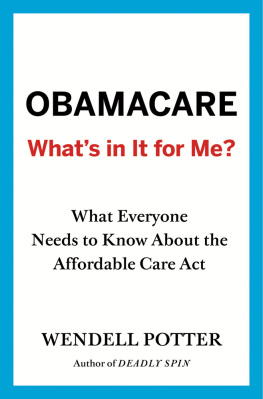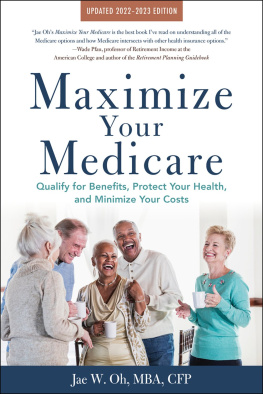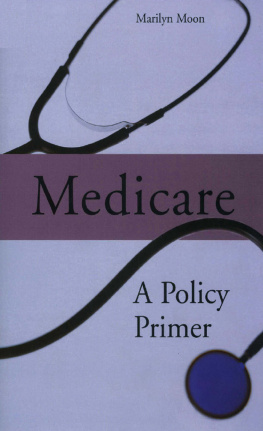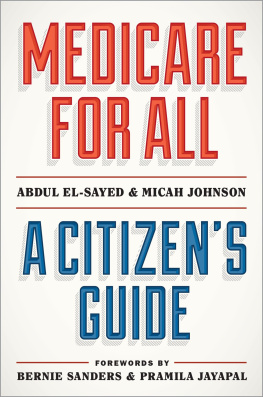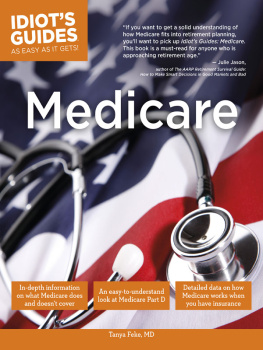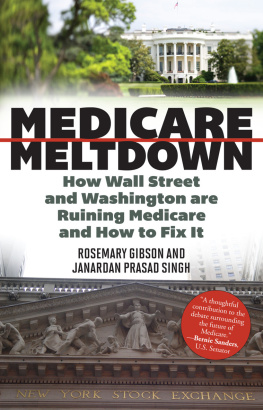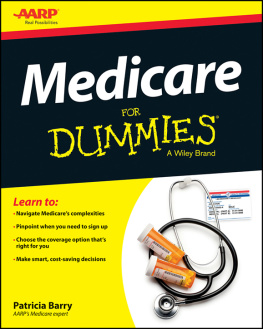Philip Moeller - Get Whats Yours for Medicare: Maximize Your Coverage, Minimize Your Costs
Here you can read online Philip Moeller - Get Whats Yours for Medicare: Maximize Your Coverage, Minimize Your Costs full text of the book (entire story) in english for free. Download pdf and epub, get meaning, cover and reviews about this ebook. year: 2016, publisher: Simon & Schuster, genre: Home and family. Description of the work, (preface) as well as reviews are available. Best literature library LitArk.com created for fans of good reading and offers a wide selection of genres:
Romance novel
Science fiction
Adventure
Detective
Science
History
Home and family
Prose
Art
Politics
Computer
Non-fiction
Religion
Business
Children
Humor
Choose a favorite category and find really read worthwhile books. Enjoy immersion in the world of imagination, feel the emotions of the characters or learn something new for yourself, make an fascinating discovery.
- Book:Get Whats Yours for Medicare: Maximize Your Coverage, Minimize Your Costs
- Author:
- Publisher:Simon & Schuster
- Genre:
- Year:2016
- Rating:3 / 5
- Favourites:Add to favourites
- Your mark:
- 60
- 1
- 2
- 3
- 4
- 5
Get Whats Yours for Medicare: Maximize Your Coverage, Minimize Your Costs: summary, description and annotation
We offer to read an annotation, description, summary or preface (depends on what the author of the book "Get Whats Yours for Medicare: Maximize Your Coverage, Minimize Your Costs" wrote himself). If you haven't found the necessary information about the book — write in the comments, we will try to find it.
Get Whats Yours for Medicare: Maximize Your Coverage, Minimize Your Costs — read online for free the complete book (whole text) full work
Below is the text of the book, divided by pages. System saving the place of the last page read, allows you to conveniently read the book "Get Whats Yours for Medicare: Maximize Your Coverage, Minimize Your Costs" online for free, without having to search again every time where you left off. Put a bookmark, and you can go to the page where you finished reading at any time.
Font size:
Interval:
Bookmark:
Thank you for downloading this Simon & Schuster ebook.
Get a FREE ebook when you join our mailing list. Plus, get updates on new releases, deals, recommended reads, and more from Simon & Schuster. Click below to sign up and see terms and conditions.
CLICK HERE TO SIGN UP
Already a subscriber? Provide your email again so we can register this ebook and send you more of what you like to read. You will continue to receive exclusive offers in your inbox.

To the day when good health care is a birthright
PHILIP MOELLER
Glen didnt retire until he turned 70 in 2010. He and his wife, Margie, were covered until then by his employers health plan. Glen read the annual Medicare & You guide put out by the Centers for Medicare & Medicaid Services (CMS). His clear understanding from the guide was that he had been automatically enrolled in Medicare since he turned 65.
This was not true. Glen made a big Medicare mistake by not asking anyone to confirm his understanding. In fact, Glen had no Medicare coverage as of 2010. Neither did Margie. But they didnt know this.
No one told me is a scary cautionary Medicare tale that could be the subtitle of this book. It is repeated in countless calls for help from people like Glen and Margie (not their real names) to Medicare consumer counselors and call-center staffers around the country. And it is voiced even by people who consider themselves otherwise smart and well informed.
As it turns out, there can be little about Medicare that is automatic or clear or, especially in the midst of a medical emergency, logical or perhaps even fair. Despite widespread contrary beliefs, people are free never to get Medicare and can simply pay their own health bills without insurance. However, if you forgo Medicare and later change your mind, there can be steep late-enrollment penalties and many months may pass before Medicare insurance takes effect.
Even for people who want health insurance, Medicare usually isnt even required at age 65 or, indeed, at any later age, so long as a personor their spouseis still working and has group health insurance coverage from a current employer. Social Security is supposed to send out Medicare cards to some people when they turn 65. Maybe it did send out a card to Glen. Maybe he thought this meant he was covered. But this doesnt always happen, especially when a person has not yet started taking their Social Security retirement benefit.
There are three really big deals about getting Medicare right:
1. Enroll at the right time. Medicare has a bewildering mix of enrollment periods. You need to use the right one.
2. Choose the right mix of Medicare coverage. There are only two main paths here. One is Original Medicare (Parts A and B), perhaps with a Medigap supplemental policy, plus a Part D prescription drug plan. The other is a Medicare Advantage plan, usually including a Part D plan.
3. Understand what these various parts of Medicare cover and how to use them.
For nearly four years, Glen and Margie had no health problems serious enough to have caused them to file a claim with Medicare and learn about their earlier mistake. But then, in 2014, Margie got sick and was diagnosed with terminal cancer. They then began trying to file claims for what eventually would be enormous medical expenses. Thats when they found out that neither of them had Medicare coverage. Glen called the nonprofit Center for Medicare Advocacy seeking help.
Glen had missed his original window to sign up for Medicare after he retired in 2010. Margie may have assumed she was automatically covered by Medicare as well. The details arent clear, although it became clear in hindsight that they never really understood that there is no family coverage under Medicare, as is routinely the case with employer health insurance.
Glen and Margie needed to file individually for Medicare. When they realized their error in 2014, they had missed one of the many enrollment periods available during the year, and were told they had to wait until the beginning of 2015 to file for Medicare. Under its rules, their coverage would not become effective until July 2015.
Glen and Margie had to face her cancer with no insurance whatsoever. Instead of being able to focus on Margies care and spending as much quality time with her as possible, Glens life instead included the prospect of crushing medical bills and the need to worry about how he would pay for his wifes care. Medical expenses are, sadly, a leading cause of personal bankruptcy.
After the center said it had no immediate solution to their problem, Glen broke off contact. More than a year later, the center reached him again. He is a defeated man, a staffer recalled. Things had turned out terribly. He did, indeed, lose his wife.
And he still didnt know if he had Medicare.
The Medicare rules say that private Medicare Advantage insurance plans must cover at least the same things that Original Medicare (Parts A and B) covers. Many people naturally assume this means the two approaches to Medicare are the same.
Big mistake.
Carols husband, Ernesto, had a Medicare Advantage plan in Texas, when he was diagnosed in June 2014 with pancreatic cancer. Little more than six months later, Ernesto would be dead following complications from surgery. During this time, when Carol wanted to spend as much time as possible with her partner, she instead had to fight insurance company rules and respond to unexpected surprises about what his Medicare Advantage plan did not cover.
Her problems stemmed from the fact that Medicare Advantage plans restrict coverage to those doctors, hospitals, and other caregivers who are in the plans provider network. Original Medicare, by contrast, insures covered medical services from any provider who accepts Medicare. When Carol was forced to take over as the main caregiver for her husband, she didnt know about these restrictions. Even after she learned about some limitations, new ones kept cropping up.
The gastroenterologist who diagnosed my husband met with us, explained the diagnosis, and called MD Anderson [the University of Texas MD Anderson Cancer Center] to refer him to a specialist. He was told that neither the doctor nor the facility accepted Medicare Advantage. Medicare, yes; Medicare Advantage no, she recalls. His insurer said it could not help her find a center with pancreatic cancer expertise, and that Carol would have to make these calls herself, which she did. All the time I took to figure out how to track down information, and to do it, took time away from being with my husband.
We even found that the local oncologist we chose told us that he would accept the plan and was in-network, she adds, but for the entire six months he saw my husband for chemotherapy and related studies, the benefit statements from the insurer showed he was not. Inaccurate billing statements flew back and forth, making it impossible for Carol to keep up with expenses and payment schedules.
In the meantime we paid bills, got refunds, and completely lost trackif there really was a trackof where we were on the maximum out-of-pocket payments, she says. Incidentally, this was not how I wanted to spend my time, and was not what either my husband or I needed in order for him to continue to live well and enjoy life as long as he possibly could.
Carol, not surprisingly, thinks that no one should ever get a Medicare Advantage plan. But millions of people do and find no problems with their coverage and service. However, if a serious medical issue arose, they may be no more equipped to deal with possible shortcomings in their plans provider network than was she. It can be difficult in the midst of a crisis to figure out what you can control and what you cannot, she cautions.
Next pageFont size:
Interval:
Bookmark:
Similar books «Get Whats Yours for Medicare: Maximize Your Coverage, Minimize Your Costs»
Look at similar books to Get Whats Yours for Medicare: Maximize Your Coverage, Minimize Your Costs. We have selected literature similar in name and meaning in the hope of providing readers with more options to find new, interesting, not yet read works.
Discussion, reviews of the book Get Whats Yours for Medicare: Maximize Your Coverage, Minimize Your Costs and just readers' own opinions. Leave your comments, write what you think about the work, its meaning or the main characters. Specify what exactly you liked and what you didn't like, and why you think so.

